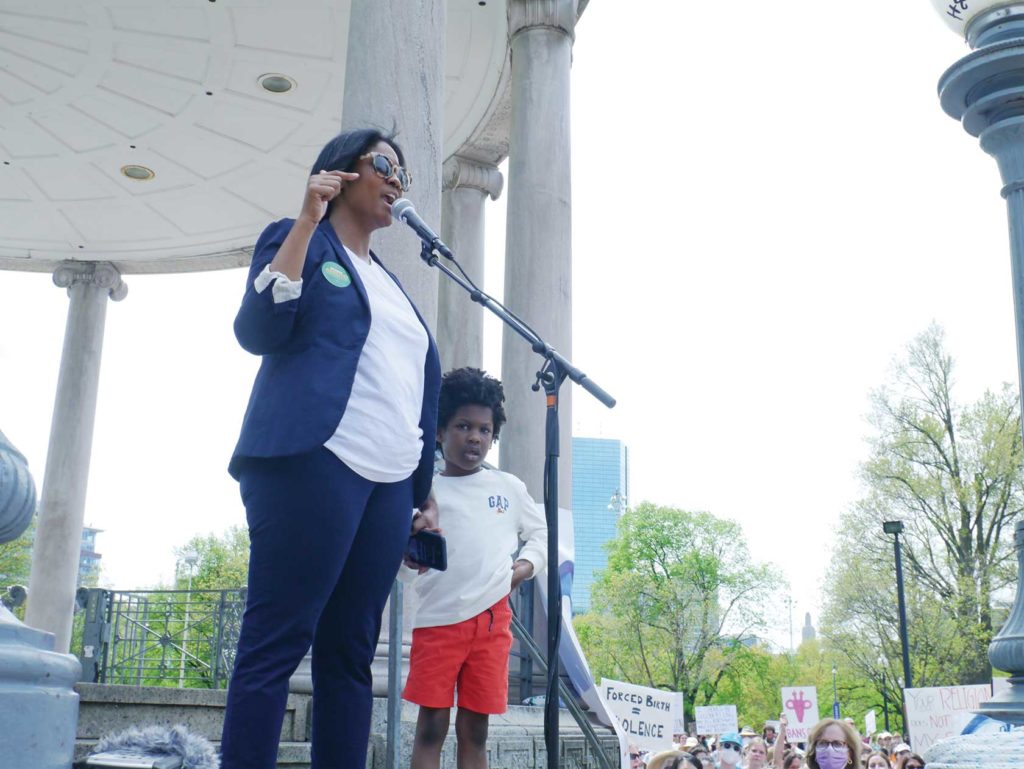
Thousands of protestors gathered at the Boston Common Saturday afternoon as part of a nationwide wave of demonstrations against attempts to restrict abortion rights.
The rallies came more than week after a draft of a Supreme Court opinion overturning the Roe v. Wade decision upholding a woman’s right to an abortion was leaked to the press on May 3, sparking outrage among women’s rights supporters and civil rights groups.
“This is a coordinated attack on our democracy, a coordinated attack on our fundamental rights, a coordinated attack on the America we aspire to be,” said NAACP Boston Branch President Tanisha Sullivan. “I’m here today to affirm and to fight with all people who believe that abortion rights are human rights, human rights are civil rights, and that this fight belongs to all of us.”
Sullivan joined other civil rights activists and elected officials speaking from the Parkman Bandstand as hundreds of demonstrators converged on the Common.
U.S. Sen. Ed Markey said Democrats must retain control of the House, Senate and presidency, vote to abolish the filibuster — a procedure Republican senators can use to block Democratic Supreme Court nominees — and codify women’s right to abortion in law.
As it stands, 28 states are considering bans on abortion that can move forward after the Supreme Court overturns Roe v. Wade, and 13 of them have bans on abortion that would kick in automatically at such time. Senate minority leader Mitch McConnell said Congress would move to ban abortions nationwide should Republicans gain control of the Senate and House.
Massachusetts Attorney General Maura Healey, who is running for governor, struck a defiant tone, saying she would resist a federal law against abortion.
“As your attorney general, I want to be really clear,” she said. “I don’t care what Congress does, I don’t care what the court issues — there is no way I will ever enforce any abortion ban in the state of Massachusetts.”
Several state legislatures, including those in Louisiana and Idaho, are also considering laws that would restrict access to contraception and so-called “morning after” pills with laws that consider life to begin at conception.
At Saturday’s rally, several speakers said bans on abortions could affect women of color disproportionately.
“When you have an attack on abortion access, that is an attack on Black women’s autonomy,” said Ndidi Amutah-Onukagha, the founder and director of the Maternal Outcomes for Translational Health Equity Research (MOTHER) Lab and a dean at Tufts University School of Medicine. “It is well-known that these laws disproportionately impact women and birthing people of color.”
Amutah-Onukagha noted that Black women are three times more likely to die from pregnancy-related complications than are their white counterparts.
District 6 City Councilor Kendra Lara shared her own story of obtaining an abortion as a 19-year-old first-year college student whose mother had just been deported to the Dominican Republic.
“I became a patient at Planned Parenthood when my contraceptive failed. Planned Parenthood helped me and walked me through what it would mean to make an autonomous decision about my body.”
“There are a lot of ways that we try to convince other people that women should have rights to make decision about their body,” she said. “We use rape, we use incest. I decided to have an abortion just because I could. If you want to have an abortion, you should do it just because you can, too.”
The Supreme Court is expected to make a ruling on Dobbs v. Jackson Women’s Health Organization, the case that would overturn Roe v. Wade, before it recesses for the summer in mid-to-late June.








